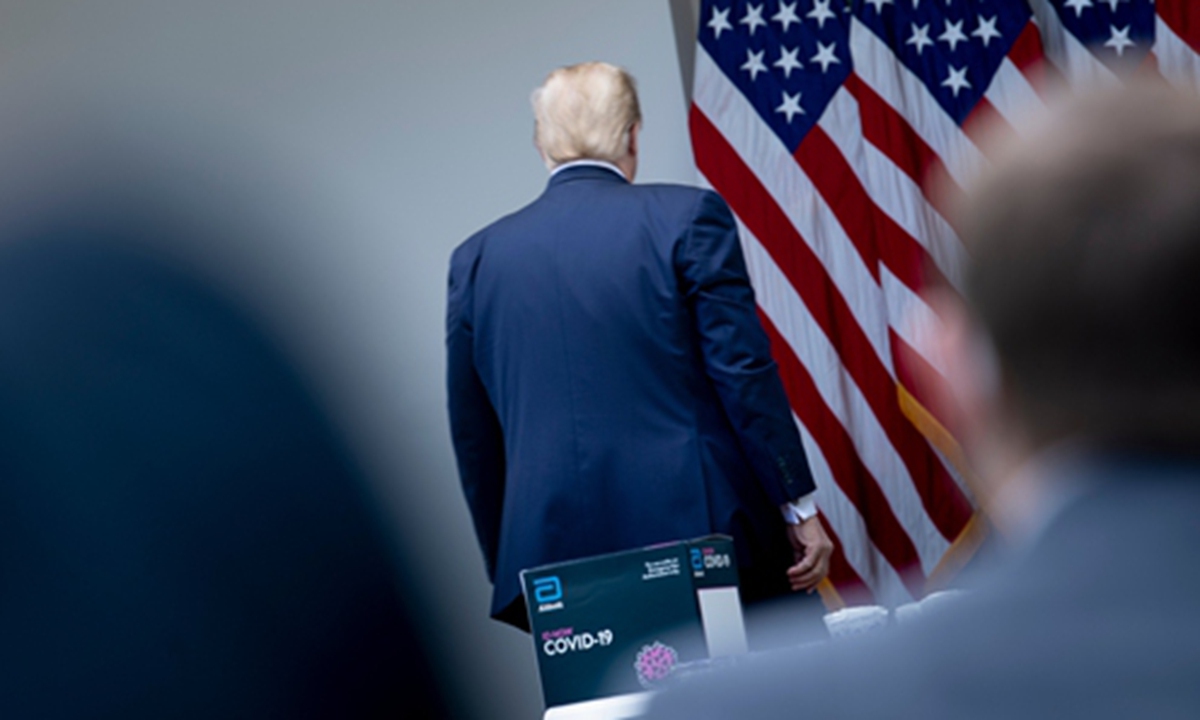
US President Donald Trump leaves a news conference on the novel coronavirus, COVID-19, in the Rose Garden of the White House in Washington, DC on May 11, 2020. Photo: AFP
President Donald Trump lost his online megaphone after several US social media platforms collectively banned his personal accounts in response to the Wednesday Capitol chaos. Twitter announced on Friday that it permanently suspended his personal account. Facebook Chief Executive Mark Zuckerberg said Thursday that the suspension of Trump's Facebook and Instagram accounts were indefinite. Google has suspended the social networking platform Parler, a popular app among Trump's supporters and right-wing conservatives.
Trump over the past four years has been regarded as "a commander in tweets." The frequency and number of tweets he posted have far exceeded those of any other leaders in the world. Many of his posts, however, were accused of being provocative, inflammatory and spreading falsehoods. Twitter accused two of his tweets posted Friday (one calling his supporters "patriots" and another saying he would not go to the presidential inauguration on January 20) of violating its rules against glorifying violence, following the storming of the US Capitol on Wednesday.
The permanent suspension of Trump's account has triggered controversy over freedom of speech in US society. Trump and his supporters accused Twitter of stifling "free speech," while US mainstream media outlets and Trump's opponents support the ban, arguing it's not an infringement upon freedom of speech. It's reported that First Amendment lawyers said the action didn't violate Trump's rights. They argued that the Constitution protects against government action censoring a citizen's speech, but Twitter is a private company.
Just imagine if an influential public opinion figure was banned on social media platforms in other countries, especially those deemed as enemies by the US. The US would vehemently accuse those countries of suppressing freedom of speech!
The hypocrisy and double standards of US democracy have increasingly been laid bare in recent years. Take freedom of speech. For American media outlets and many Americans, those who can speak and whose "freedom of speech" is protected are those who hold similar political viewpoints with them.
For Trump's allies and supporters, banning Trump on Twitter and other social media platform is an attempt to wreck freedom of speech. It's unacceptable to them. But for Trump's opponents, it's a necessary measure to denounce violence, smash efforts to glorify violence, and protect social order and stability. The so-called freedom of speech is just a tool for Americans to attack each other, or insult other countries.
Regardless of US hypocrisy when it comes to freedom of speech, banning Trump on social media platforms offers us a chance to redefine and understand freedom of speech. "Even in the US, a country which claims itself to be the beacon of democracy, freedom of speech has boundaries and bottom lines," said Xin Qiang, deputy director of the Center for American Studies at Fudan University.
Free speech doesn't mean irresponsible narratives, including those inciting violence, racism and group discrimination. It does not mean spreading rumors and lies under the banner of freedom of speech, Xin noted.
The next time when the US points an accusing finger at other countries' efforts to regulate online contents, can it bear this fact in mind?
The author is a reporter with the Global Times. opinion@globaltimes.com.cn




